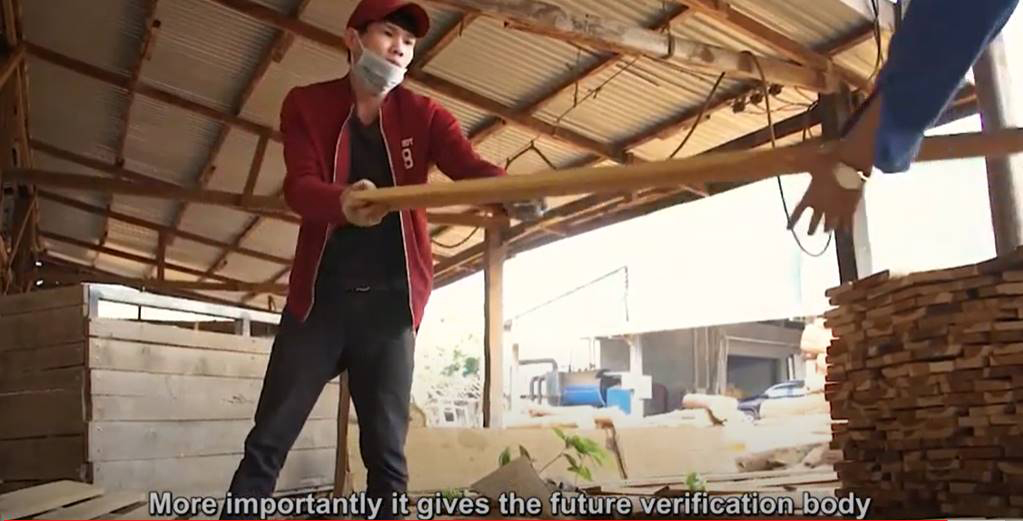Strengthening Forest Governance to Preserve Laos’ Natural Treasure!

Laos and the EU have agreed on several piloting measures to test the robustness of the agreed Timber Legality Definitions (TLDs), one of five elements within TLAS (Timber Legality Assurance System) that form the core of assuring timber legality. Laos has agreed to test verification and licensing procedures for timber from tree plantations that are currently under development by the FLEGT multi-stakeholder process. It started with a series of stakeholder consultations to elaborate on the future function of verification and how it can co-function with the existing inspection system.
In the year 2019, Laos issued its new forestry law. It includes developing a timber legality assurance system, or TLAS, to ensure legal and sustainable use of the country’s forest resources.
TLAS is the central element of the Voluntary Partnership Agreement (VPAs), the bilateral trade agreements between the EU and timber-exporting countries outside the EU. The German government, through GIZ, currently supports Laos in negotiating this partnership agreement with the EU on forest law enforcement, governance and trade, known as FLEGT (Forest Law Enforcement Governance and Trade).
This agreement sets out the legal obligations and measures to combat illegal logging and improve governance in the forestry sector. This participatory decision-making process involves government agencies, civil society organizations, and the private sector.
The Lao-TLAS is designed to verify that all wood products conform with national legislation. Within the TLAS, specific legal references have been selected in a multistakeholder approach to agree on what represents legal timber and how it can be traced from the forest to the point of sales or export.
The TLAS consists of a total of five elements, of which four form the core of assuring timber legality:
- Timber Legality Definitions (TLD) are a selection of legal requirements for timber products from different sources and the results of the stakeholder consultation process.
- Supply Chain Control describes the requirements for tracing wood and wood products in quantity, quality and identity from forest or point of import through transport and processing to the point of sale or export.
- Verification of compliance ensures that all the requirements for legality set out in the TLD have been met. It checks if all information along the supply chain is correct and that products come from a legal source.
- Once the legal compliance of TLDs and supply chain control has been verified and all requirements are met, a license can be issued, and the products can be exported or sold on the domestic market.
TLDs and supply chain control need to be easy to understand, implement, and verify. Therefore, they should undergo testing before they are finalized. Hence, Laos and the EU have agreed on several piloting measures to test the robustness of the agreed TLDs. This is to make sure that all supply chain controls are clear, implementable, and verifiable in the field.
For Laos, it was agreed to test verification and licensing procedures for timber from plantations. It started with a series of stakeholder consultations to elaborate on the future function of verification and how it can co-function with the existing inspection system.
The piloting supports a critical review of each compliance requirement and can lead to an amendment of the existing TLDs. This video of piloting of verification procedures in Plantation gives the future verification body and other agencies involved in the FLEGT work an understanding of the scale of verification, as well as the ability to plan and cooperate for ensuring timber legality compliance.
Testing of elements of the TLAS will ensure its longevity and ease the later implementation. Only with joint efforts by all stakeholders the sustainable utilization of Lao forests and the legal trade of timber products can be assured.
For more technical details and stories from the field, check out the video of this piloting https://www.youtube.com/watch?v=STYleqpW4M0
Contact person
Martin Nowack, ProFEB Project Director: martin.nowack@giz.de
Tobias Goedde, FLEGT Team Leader, email: tobias.goedde@giz.deProtection and Sustainable Use of Forest Ecosystems and Biodiversity (ProFEB)
Link to further materials
https://www.youtube.com/watch?v=STYleqpW4M0 to the video.
Link to FLEGT website
Home – Lao-EU Forest Law Enforcement, Governance and Trade towards (flegtlaos.com)
Key buzzwords / “tags”
Forest Monitoring, Forest Law Enforcement, FLEGT, Illegal Logging, Laos

